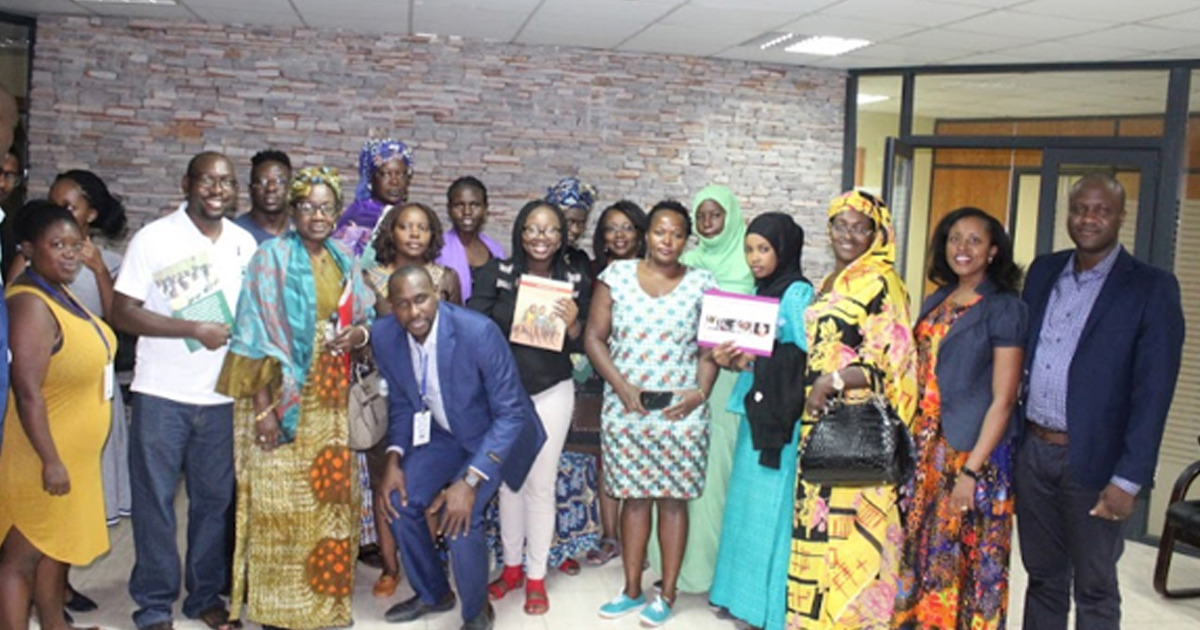The Centre for Human Rights (the Centre) in partnership with Equality Now, Girls not Brides, Human Rights Watch and Plan International hosted a panel discussion on the recently adopted Joint General Comment to End Child Marriages and the Report on Child Marriage, commissioned by the African Commission on Human and People’s Rights (African Commission).
The discussion took place on 24 April in Nouakchott, Mauritania within the framework of the NGO Forum at the sidelines of the African Commission’s 62nd Session. The panel consisted of Satang Nabaneh (the Centre), Jean Paul Murunga (Equality Now), Agnes Odhiambo (Human Rights Watch), and Yvette Kathurima Muhia (Girls not Brides). The panelists outlined the findings and recommendations of the research on child marriage and the content of the Joint General Comment to End Child Marriage before engaging participants in a discussion on how the Joint General Comment can be used as a tool to end child marriage.
The Research Study provides a context of child marriage on the continent. It identified the root causes, prevalence, practices, customs and beliefs that perpetuate child marriage. It also assessed the levels of State compliance with international and regional obligations requiring states to prevent child marriage and the and reporting on legislative and policy frameworks and selected initiatives to address child marriage. The study was conducted in Cameroon, Democratic Republic of Congo, Kenya, Mali, Mauritania, Malawi, Mozambique, South Africa, the Gambia and Uganda. The findings of the study framed the developed of the Joint General Comment.
![]() Download the Report on Child Marriage in Africa (English)
Download the Report on Child Marriage in Africa (English)![]() Télécharger le Rapport sur le Mariage d'Enfants en Afrique (Francais)
Télécharger le Rapport sur le Mariage d'Enfants en Afrique (Francais)
The Joint General Comment is hailed as a landmark for prevention, protection and support for vulnerable children and victims of child marriage. This Joint General Comment is the first ever General Comment to be developed jointly by the African Commission and the African Committee of Experts on the Rights and Welfare of the Child. The aim of this Joint General Comment is to elaborate on the nature of State Party obligations that arise from Article 6(b) of the Protocol to the African Charter on Human and Peoples’ Rights on the Rights of Women in Africa (Maputo Protocol) and Article 21(2) of the African Charter on the Rights and Welfare of the Child (ACERWC) which explicitly prohibit child marriage.
![]() Download the Joint General Comment of the ACHPR and ACERWC on ending child marriage (English)
Download the Joint General Comment of the ACHPR and ACERWC on ending child marriage (English)![]() Télécharger l'Observation Générale Conjointe du CADHP et CAEDBE sur l’eradication du mariage des enfants (Francais)
Télécharger l'Observation Générale Conjointe du CADHP et CAEDBE sur l’eradication du mariage des enfants (Francais)
Key issues addressed in the Joint General Comment
The scope of the General Comment includes children at risk of child marriages, children in marriages and women who were married before age of 18. Boys at risk or affected by child marriage are also included.
It notes that gender inequality is both a consequence and drive of child marriage and the disproportionate impact of child marriages on girls
The Joint Comment describes legislative, institutional and other measures that should be taken by State Parties to give effect to the prohibition and to protect the rights of those at risk or affected by child marriage.
Legislative Measures
- Specify 18 years as minimum age for marriage
- Legal prohibition of Harmful Practices such as kidnapping and abduction for marriage
- Inclusion of stakeholders including children in norm development
- Legislate on full and free consent to marry
- Ensure verification of consent by marriage officers
- Undertake Constitutional reforms and make these provisions non-derogable
- Ensure legal equality in marriage
Institutional and other Measures
- Implementation of verification procedures: birth registration, age verification and marriage registration
- Full enforcement of laws, penalties and sanctions + accountability
- Promotion of education and retention of children in schools
- Access to and uptake of health services
- Promote access to justice
- Provide redress and support for those children already married
- Capacity building and training
- Data collection and management
Discussion and way forward
Participants discussed the following issues:
- The negative societal perceptions with early pregnancy and early sexual debut and the problematic response of marriage as the solution.
- The challenges of ensuring that you girls who fall pregnant continue with their education.
- Lack of support services including psychosocial support and shelters for children seeking divorce and are unable to go back home.
- The differences between the age of consent to sex and minimum age of marriage. The responsibilities and impact of child marriage are far greater than those relating to sex and therefore the two issues should not be conflated.
Gaps in the Joint General Comment
- The Joint General Comment does not explicitly call on State Parties to decriminalize consensual sex among adolescents
- It also fails to criminalise parents who force their children into marriages
Next steps and use of the Joint General Comment
- Harmonising laws to ensure age of marriage to 18 with no exception
- Dissemination of the Joint General Comment to End Child Marriage and awareness raising of the contents of the Joint General Comment including production of simplified versions and translations into local languages
- Advocate for the ratification of the Maputo Protocol by the 15 countries that have not yet ratified it and removal of reservations on child marriages were applicable.
- Campaigns to ensure registration of marriages and births so that age of marriages can be verified.


